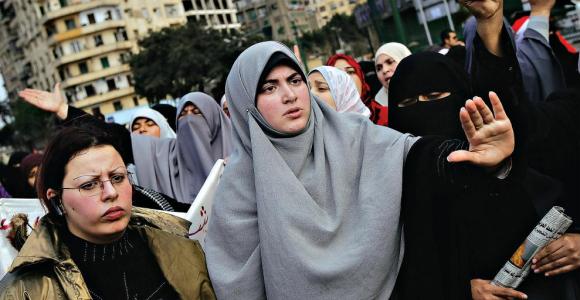A Revolution Just Beginning
Blog Post
One of the earliest and most important questions raised by the Egyptian revolution, and one that is still being asked, is this: Where are the Egyptian women? The answer I give: Women in Egypt are getting to a better place, but the path is long and hard.
Our 18-day sit-in in Tahrir Square in January that brought down Hosni Mubarak’s regime broke many barriers in Egyptian society. I’ll never forget the day when young conservative men were the ones who cooperated with young women activists against the ruthless fire of Mubarak’s police force. We would have never mingled in that way before that.
Women broke the norms. We played a different role than that ascribed to us by tradition and culture. We struggled for change, both in politics and within ourselves, to prove that we were up to the challenge. And we succeeded. I saw women walking, proud and tall, a new body language that screamed confidence. Women were carefree, talking and laughing on the streets that they had fought for and finally won over.
A new revolutionary phase has started, one with challenges for women in the public sphere and in private life, and for me as an activist. Many questions come to my mind: Will we be able to continue struggling for a more radical social revolution? Will we be able to sustain it throughout the next stages of changing Egypt to the civil democratic country we dreamed of? We fought for “freedom, dignity and social justice,” the slogans we unflaggingly chanted throughout the amazing, harsh and challenging 18 days. How can we continue to resist and promote these values now?
Many incidents since then indicate a regression for the role of women. Not a single woman was chosen in the committee that amended the Egyptian Constitution; sexual harassment incidents are reported daily and were blatant during the celebration of International Women’s Day on March 8, when military police arrested people for protesting on the streets and conducted forced virginity tests on women they detained.
All this can create the feeling that there is no hope, that you can change a regime in Egypt but you cannot gain more rights and freedoms for women.
We have to realize that this is only the beginning of a long struggle, here and in the greater Arab world which is now in upheaval. Is it more important to gain more basic rights long denied to women or to work with people for political gain and real equality? This question is answered when you look at women not only in Egypt, but also at those protesting in Tunisia and Syria. Although they gained some rights through laws under these regimes, it has not been enough.
Naming January 25 a “revolution” instead of an “uprising,” means that women are expecting to pass through difficult phases. We’ve managed the first, and perhaps easiest one, but we have a long way to go, a path that requires tremendous effort, new discourses and interventions.
We decided as women, regardless of our own differences, to work together to mobilize society behind our demands. We realized that building an inclusive movement of women and men was our best path.
The revolution has inevitably forced new realities on us — working on women’s attitudes and contributions to societies is no longer an option, but a necessity. Women have to continue to force their way into the public space and destroy the myth of their inability to perform certain roles as activists or in politics. The movement will deconstruct the stereotype that there is only one type of Egyptian woman that does (and should) exist.
I am witnessing this: Women are joining the political sphere and building their legacies to run for elections; young people are creating new social groups; women’s rights coalitions are forming to protect our existence in the new post-revolution era. It is their own real work that is laying the foundation of change.
This is how movements are built and how spaces are protected. The revolution was the work of different generations that struggled to protect the space and widen it for others. This is our challenge now — to continue building on what we gained and expand it. We cannot allow ourselves to be overwhelmed by the obstacles ahead.
* Cross-posted from New York Times.



